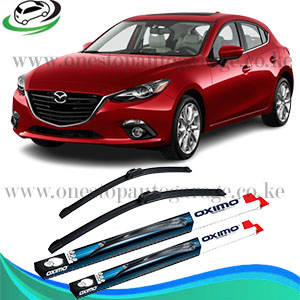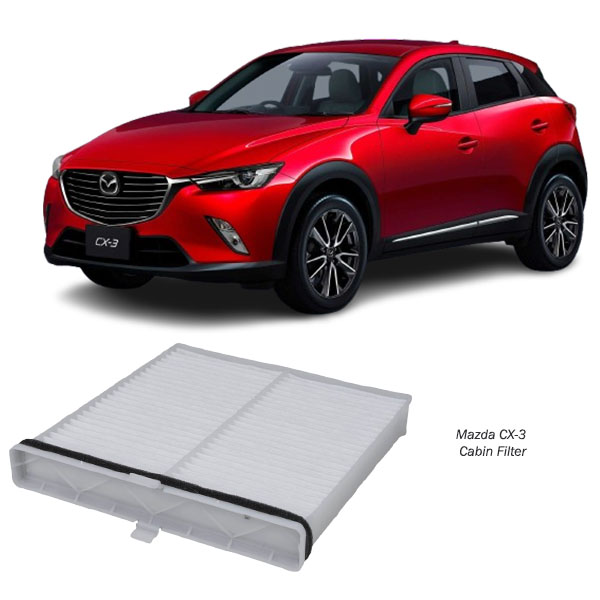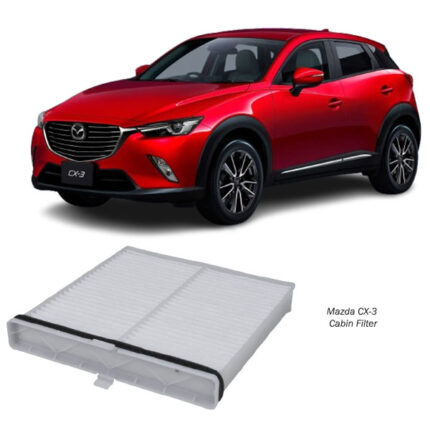Get Mazda CX-3 Cabin Filter Element D09W-61-J6X in Kenya
The cabin filter element, often overlooked, plays a pivotal role in enhancing the comfort and health of passengers in a vehicle. This essential component works silently behind the scenes, ensuring that the air inside the car’s cabin is clean and free from pollutants. In this comprehensive guide, we will delve into the details of cabin filter elements, including their functions, types, benefits, signs of wear, maintenance, and more.
1. What is a Cabin Filter Element?
A cabin filter element is a filtration device located within the vehicle’s HVAC (Heating, Ventilation, and Air Conditioning) system. Its primary function is to purify the air that enters the cabin from the outside environment through the air vents.
The cabin filter traps contaminants such as:
- Dust
- Pollen
- Dirt
- Mold spores
- Exhaust fumes
- Allergens
By doing so, it ensures that passengers breathe clean, filtered air, enhancing comfort and protecting health.
2. Functions of a Cabin Filter Element
a. Air Purification
The primary role of the cabin filter is to remove airborne pollutants, ensuring that the air circulating inside the car is clean and healthy.
b. Odor Control
Some cabin filters are equipped with activated carbon layers that can absorb unpleasant odors, smoke, and harmful gases like ozone.
c. HVAC System Protection
The filter prevents dirt and debris from clogging the HVAC system, which could otherwise compromise its efficiency and longevity.
d. Allergy Reduction
By filtering allergens such as pollen and dust, the cabin filter provides relief for passengers with respiratory issues or sensitivities.
3. Types of Cabin Filters
There are several types of cabin filters, each catering to different needs and preferences:
a. Particulate Filters
- Designed to trap solid particles like dust, pollen, and dirt.
- Commonly found in most vehicles as a basic filtration solution.
b. Activated Carbon Filters
- Contains a layer of activated carbon for enhanced filtration.
- Absorbs harmful gases, odors, and fumes in addition to solid particles.
c. HEPA Filters (High-Efficiency Particulate Air)
- Offers superior filtration, trapping microscopic particles such as bacteria and viruses.
- Ideal for individuals with severe allergies or respiratory conditions.
d. Hybrid Filters
- Combines particulate and activated carbon layers for comprehensive filtration.
- Balances effectiveness with cost-efficiency.
4. Benefits of Cabin Filter Elements
The advantages of having a clean and functional cabin filter are numerous:
a. Improved Air Quality
A clean cabin filter ensures that passengers breathe air free from pollutants, improving overall well-being.
b. Enhanced Comfort
By removing odors and allergens, the cabin filter contributes to a more pleasant in-car experience.
c. HVAC System Efficiency
A clean filter allows the HVAC system to operate efficiently, providing optimal airflow and temperature regulation.
d. Extended HVAC Lifespan
Preventing debris buildup in the HVAC system reduces wear and tear, extending its lifespan.
e. Health Benefits
Filtering out harmful pollutants minimizes the risk of respiratory problems, particularly for individuals with asthma or allergies.
5. Signs of a Worn or Clogged Cabin Filter
A cabin filter needs regular maintenance or replacement to perform effectively. Look out for these signs of a failing or clogged filter:
a. Reduced Airflow
If the air coming through the vents feels weak or restricted, it could indicate a clogged filter.
b. Unpleasant Odors
A dirty filter may allow foul smells to permeate the cabin or even emit odors of its own due to trapped debris.
c. Increased Allergies
Passengers experiencing worsening allergy symptoms during drives may be exposed to unfiltered allergens.
d. Foggy Windows
Poor filtration can lead to reduced HVAC efficiency, causing issues like fogged windows due to improper airflow.
e. Unusual Noises
A clogged filter might strain the HVAC system, leading to unusual sounds from the vents.
6. Causes of Cabin Filter Deterioration
Several factors can contribute to the wear and inefficiency of a cabin filter:
a. Environmental Conditions
Driving in dusty, polluted, or construction-heavy areas can accelerate filter clogging.
b. Neglected Maintenance
Failure to replace the filter at regular intervals results in accumulation of debris and reduced performance.
c. Seasonal Factors
Spring and fall, with high levels of pollen and leaves, can clog filters faster.
d. Excessive Use
Frequent use of the HVAC system, particularly in extreme climates, can wear out the filter sooner.
7. Maintenance and Replacement of Cabin Filters
a. How Often Should You Replace a Cabin Filter?
Manufacturers typically recommend replacing the cabin filter every 12,000 to 15,000 miles or at least once a year. However, this interval may vary based on driving conditions and vehicle usage.
b. Steps to Replace a Cabin Filter
- Locate the Filter: Cabin filters are usually found behind the glove box, under the dashboard, or near the HVAC intake.
- Access the Filter Housing: Remove any panels or screws to access the filter housing.
- Remove the Old Filter: Take out the old filter and note its orientation.
- Insert the New Filter: Place the new filter in the housing, ensuring proper alignment.
- Reassemble: Secure the housing and any panels or screws that were removed.
c. Professional Assistance
For those unsure about DIY replacement, a professional mechanic can replace the filter during routine maintenance.
8. Choosing the Right Cabin Filter
Selecting the right cabin filter for your vehicle is crucial for optimal performance. Consider the following factors:
a. Compatibility
Ensure the filter is compatible with your vehicle’s make and model.
b. Filtration Needs
Choose the filter type (particulate, activated carbon, HEPA, or hybrid) based on your requirements.
c. Brand Reputation
Opt for reputable brands known for quality and reliability.
d. Cost
While cost is important, prioritize performance and durability over cheap alternatives.
e. Environmental Impact
Some brands offer eco-friendly options made from biodegradable materials.
9. Benefits of Regular Cabin Filter Maintenance
a. Prolonged HVAC Lifespan
Regular maintenance prevents strain on the HVAC system, ensuring its longevity.
b. Consistent Comfort
Maintaining a clean filter guarantees a pleasant in-car environment at all times.
c. Cost Savings
Replacing the filter at recommended intervals prevents costly repairs caused by debris buildup in the HVAC system.
d. Better Resale Value
A well-maintained vehicle with a functioning HVAC system has higher resale appeal.
10. Frequently Asked Questions
a. Can I clean and reuse a cabin filter?
While some filters are designed to be washable, most are disposable. Always check the manufacturer’s recommendations.
b. What happens if I don’t replace my cabin filter?
A clogged filter can compromise air quality, reduce HVAC efficiency, and lead to system damage.
c. How do I know which cabin filter my car needs?
Refer to your vehicle’s owner manual or consult with a professional mechanic.
d. Is a more expensive cabin filter worth it?
High-quality filters, such as HEPA or activated carbon types, offer superior filtration and are worth the investment for sensitive passengers.
11. Conclusion
The cabin filter element is a small yet vital component that significantly impacts the comfort, health, and functionality of your vehicle. By understanding its role, maintaining it regularly, and choosing the right replacement, you can ensure a clean and pleasant driving experience for yourself and your passengers. Prioritize timely replacement and invest in quality filters to enjoy improved air quality, enhanced HVAC performance, and a healthier in-car environment.
Follow us on Facebook for more parts.




